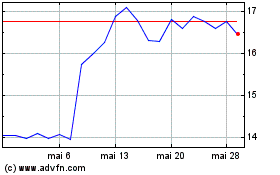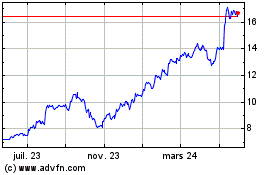By Denise Roland in London and Rory Jones in Tel Aviv
This article is being republished as part of our daily
reproduction of WSJ.com articles that also appeared in the U.S.
print edition of The Wall Street Journal (August 4, 2017).
The world's biggest seller of generic drugs lost a quarter of
its market value Thursday as concerns mounted about the future of
the company, which has no chief executive and is struggling under
the weight of an acquisition streak.
Adding to the woes, Teva Pharmaceutical Industries Ltd.'s
biggest shareholder, Allergan PLC, said it planned to sell its
stake, further weighing on the stock. Teva's shares tumbled 24% on
Thursday to $23.75 in New York trading.
Since the end of 2015, Teva's shares are down 64%, a decline
that has erased more than $40 billion in market capitalization.
The Israeli drugmaker posted disappointing second-quarter
results, cut its full-year outlook and slashed its dividend,
blaming the rapid deterioration of its all-important U.S.
generic-drug business.
Teva is confronting multiple challenges without a permanent
chief executive after the abrupt February departure of former boss
Erez Vigodman. Like other generic drugmakers, Teva faces a tough
pricing environment and increasing competition that is squeezing
already-tight margins. It is also saddled with about $35 billion in
debt and a sprawling supply chain accumulated through
acquisitions.
A series of deals has transformed Teva, founded before the state
of Israel to ship drugs by camel across Ottoman-controlled
Palestine, from an obscure player in generic drugs to the
industry's most important. One in every seven prescriptions in the
U.S. is for a Teva drug.
But last year's acquisition of Allergan's generics unit --
Teva's biggest-ever deal -- handed the company a huge debt pile
that it is struggling to pay down amid an industrywide
slowdown.
Allergan acquired its 9.9% stake in the company when it sold its
generics business to Teva for $40.5 billion 2016. On a conference
call Thursday, Allergan's chief financial officer said the company
intended to sell the shares now that a one-year lockup period had
expired.
Many investors have said they believe Teva paid too high a price
for the Allergan business, given the subsequent deceleration in
generic-drug sales. On Thursday, Teva said it had taken a $6.1
billion write-down on its U.S. generics unit to reflect dimming
prospects, dragging the company's quarterly net loss down to $6.04
billion. That compares with a $188 million net profit in the second
quarter of 2016.
Another recent deal, the $2.3 billion acquisition of Mexican
generic drugmaker Rimsa, has also created problems. Teva bought the
company last year but shut down Rimsa's sole manufacturing plant
immediately, saying it was improperly managed. Teva is locked in a
legal battle with the Rimsa's former owners over alleged breach of
contract.
Teva said it now expects adjusted earnings per share of $4.30 to
$4.50 for 2017, down from earlier guidance. It also cut revenue
expectations.
Adjusted for the write-down and other items, Teva's quarterly
profit was $1.04 billion, compared with $1.23 billion in the
year-earlier period, falling short of Wall Street expectations.
Revenue rose 13% to $5.69 billion but also missed forecasts.
The company also slashed its dividend in the second quarter to
8.5 cents, from 34 cents for the first three months of the
year.
Interim President and CEO Yitzhak Peterburg said he understood
"the frustration and disappointment of our shareholders" and
promised to "aggressively confront our challenges" by cutting
costs, selling off parts of the business and paying down debt.
But Teva is in a tough spot. Mike McClellan, interim chief
financial officer, told analysts on Thursday that the company
risked breaching its debt covenants this year should its potential
asset sales generate lower proceeds than hoped.
In June, Teva nominated four new directors in an effort to
address investor concerns that its board lacked international
pharmaceutical experience. But without a permanent CEO, investors
are skeptical of the company's ability to get a turnaround under
way.
"It's a rudderless ship until Teva gets a real CEO," said Benny
Landa, an activist investor in the firm. "The most important thing
is getting leadership on the board and a CEO with global
experience."
Mr. Landa and some other shareholders have advocated for the
company to be split into different divisions, one focused on
generic drugs and the other on specialty medicine. Some investors
argue the two businesses should be run by different management or
separated entirely.
Teva Chairman Sol Barer wouldn't comment on the prospects of a
breakup on a call with analysts Thursday. He said management was
focusing on its business and financial priorities "very
aggressively right now."
In June, Mr. Barer said the company was interviewing candidates
for the top job, and the choice would likely be someone with global
drug-industry experience, from outside Israel but willing to live
in the country.
AstraZeneca PLC CEO Pascal Soriot was last month linked to the
job, but neither company has commented on what both described as
"market rumors."
Teva has been trying for several years to make progress on an
overhaul. In 2012, Teva hired Jeremy Levin from Bristol-Myers
Squibb Co. to take the helm, but he was forced out the next year
during a dispute with the board over the company's direction.
His replacement, Mr. Vigodman, an Israeli who was familiar with
the firm from his time serving on its board but lacked a
drug-industry background, left the company in February amid
investor criticism over the Allergan generics deal and a deep fall
in Teva's share price.
Mr. Vigodman has declined to comment on the reasons for his
departure. Longtime CFO Eyal Desheh left Teva in June.
Underscoring the challenge a new chief faces in making wholesale
changes, Teva last month said it would cut roughly 350 jobs in
Israel at two factories, causing an uproar among the firm's
unionized employees.
An Israeli parliamentary committee last week examined the issue
and called on Teva to negotiate with union employees or risk losing
tax breaks.
"The committee will take off its gloves" if Teva doesn't
negotiate, lawmaker Micky Rosenthal told Israeli media.
He said the firm had received 18 billion Israeli shekels, or $5
billion, over the past decade in tax benefits, calling that an
"inconceivable amount."
Write to Denise Roland at Denise.Roland@wsj.com and Rory Jones
at rory.jones@wsj.com
(END) Dow Jones Newswires
August 04, 2017 02:47 ET (06:47 GMT)
Copyright (c) 2017 Dow Jones & Company, Inc.
Teva Pharmaceutical Indu... (NYSE:TEVA)
Graphique Historique de l'Action
De Juin 2024 à Juil 2024

Teva Pharmaceutical Indu... (NYSE:TEVA)
Graphique Historique de l'Action
De Juil 2023 à Juil 2024
